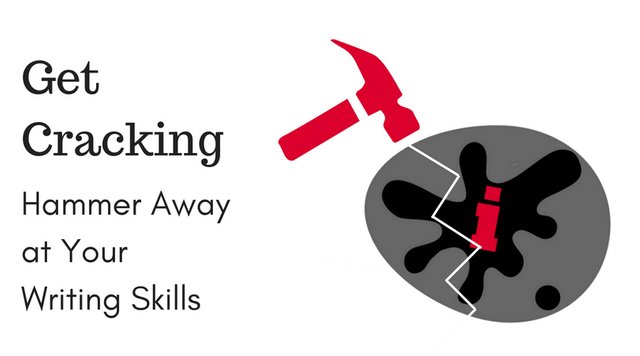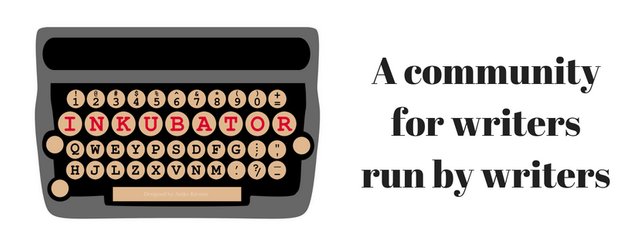Get Cracking: Show vs. Tell (Exercise #1)

If we want to grow as writers, we need to practice our craft, push our boundaries, and hone our abilities to control the mechanics of the written word. Mastering the rules is essential before you start breaking them. How else can we know what rule to break and when or, more importantly, why?
Here at INKubator, we recognize the value of a kick in the rear end to help push ourselves to grow and improve. For this reason, we invite you to join us in an ongoing series of exercises, readings, and writing prompts that, combined with thorough peer review of the results, should help all of us hammer our way into new levels of our craft.
We've titled the series "Get Cracking: Hammer Away at Your Writing Skills." Some exercises will result in full stories or poems and some focus only on the mechanics. Where possible, we recommend applying the exercise to a project you are currently working on, if not creating an independent finished piece, so you can feel you are growing your portfolio as well as your skills.
To get the best results, we recommend joining our Discord server and participating in #inkubator. We'll be having more discussion and possibly some small in-between challenges and assignments that don't make it to our blog. You can post your writings in response to the exercises in #ink-review to ask for help looking it over.
We operate as a peer review system, so we do expect everyone to give feedback on at least two other writers for every exercise you participate in. The reason for this is that learning to edit is an essential part of writing. It is often easier to learn to find the weaknesses in our own writing after we've seen the impacts they have in the writing of others. By giving feedback to others, you are building your own writing skills.
Anyone can join any of the exercises at any time and skip those you want to skip. We're happy to work with you even if the majority of the group has moved on to a different exercise. You're also welcome to work at your own pace. We will be offering recommended deadlines within our server group for those who work best with a deadline. But we aren't going to kick anyone out or think less of them for being behind--let us know, however, if you need that extra shove to stick to a deadline for your own growth. We recognize that each member has their own journey to follow, but will work together to support each other as we progress.
You're also welcome to work on our exercises on your own or share them with your writing group without joining our Discord server.
The results of any exercise is your own to do with as you wish. We don't recommend publishing anything that isn't a complete stand-alone piece to a public forum, like your blog, but the choice is yours. As for those complete stand-alone pieces, we wish you the best of luck finding a suitable publishing venue.
The Exercise
One of the most essential and fundamental rules of writing well is: show, don’t tell. What this means is often hard to explain. Telling can be easier, so even experienced writers often find tells creeping into their writing, especially in first drafts.
It's okay to shortcut and use tells to complete a first draft, as long as we remember to go through and replace them with the more vivid and intense shows when we do our initial edits.
But that's hard to do if we don't recognize when we're telling.
For this exercise, we're going to present a series of basic tells. Your job is to do what you'd do on that rewrite of your first draft--expand the tells into shows. Feel free to let the tells inspire small scenes, vignettes, or even microfiction stories, but this isn't mandatory. What's required is to find an effective way of showing what the initial draft tells us.
What POV you use is up to you. You are welcome to use characters or settings from your own work. Perhaps a tell matches a scene you have planned for your novel so you can practice the show in a way that is useful for your work, even if that requires a small tweak to your tell.
Tell: The man was angry.
Show: Jack clenched his fists and his lip curled into a snarl.
This is a very basic example, but the best shows use more senses than just vision. See what you can do to use other senses in the following.
Also remember that an excellent show is no better than a tell if it doesn't make sense in context. Feel free to incorporate context in your exercise, but this isn't mandatory.
The practice tells:
- The house was old and scary.
- The chocolate pudding was delicious.
- The baby was sick.
- He seemed depressed.
- It all went to hell.
- Something smelled bad.
- She looked like she was thinking.
- He was insulted.
- The animal was scared.
- That's a cute kid you have.
Posted from our blog with SteemPress : http://inkubatorcommunity.com/get-cracking-show-vs-tell-exercise-1/
Interested in our community? Follow the link below.

Congratulations @ink-ubator! You have completed the following achievement on Steemit and have been rewarded with new badge(s) :
Click on the badge to view your Board of Honor.
If you no longer want to receive notifications, reply to this comment with the word
STOPTo support your work, I also upvoted your post!
STOP
Notifications have been disabled. Sorry if I bothered you.
To reactivate notifications, drop me a comment with the word
NOTIFYCongratulations @ink-ubator! You have completed the following achievement on Steemit and have been rewarded with new badge(s) :
Click on the badge to view your Board of Honor.
If you no longer want to receive notifications, reply to this comment with the word
STOP